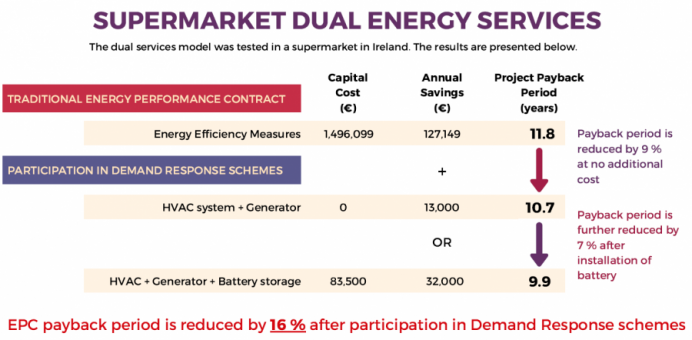Innovative new business model reduces payback period of energy efficient building refurbishment projects by up to 16%
Over the last three years, the NOVICE project, coordinated by IERC, has been testing the validity of a new business model for Energy Service Companies (ESCOs) that combines both energy efficiency and demand response services into a single service offering. The idea is that by cooperating with demand response aggregators, ESCOs can access both energy efficiency savings and revenues from offering the site’s flexibility to the grid, thus enabling faster repayment of the initial investments . An Enhanced Energy Performance Contract (EPC) will guarantee building owners a minimum level of energy savings and occupant comfort whilst ensuring that a maximum value can be extracted from the flexibility potential of on-site energy assets. The result is a new business model that allows ESCOs to work together with demand response aggregators to provide a holistic package of energy services, enhancing the business case for renovation projects and driving up renovation rates across Europe.
NOVICE demonstrated the proposed business model through two case studies: a leisure centre in Dublin and a supermarket in Kilkenny, Ireland. At the Dublin site, the project investigated how much load shedding potential there is in a typical leisure centre, what would be the impact of participating in demand response schemes on the indoor environmental conditions and if people would notice any changes to their thermal comfort. Since the site was too small to be allowed to participate in flexibility schemes, the demand response event had to be simulated by turning off non-essential HVAC (heating, ventilation and air conditioning) equipment for two hours. The experiment revealed that the flexibility potential for such a site is only around 45 kW, equating to around €400 of annual demand response revenue, which proves that this site is indeed too small for the aggregators to consider including in their portfolio. During the event, the indoor conditions did change slightly as a result of the reduced use of HVAC, but remained within acceptable limits at all times. Interestingly, a survey performed on site on the day of the simulation revealed that the majority of the people using the leisure centre at the time of the event did not notice this change in indoor conditions.
The second case study consisted of an assessment of the energy efficiency and flexibility potential for a supermarket in Kilkenny. A package of energy efficiency measures had been identified for this site that, if implemented, would result in a 36% reduction in site energy consumption, with a project payback period of 11.8 years. The aim of this analysis was to investigate whether participating in demand response schemes would reduce the project payback period further, thus improving the business case for the EPC. A quote from a local aggregator showed that the payback period can be reduced to 10.7 years (or 9.3% improvement) simply from selling the site’s flexibility to the electricity grid. If the building owner would also consider the installation of a 150 kW battery storage system on site at an additional capital cost of €83,500, then the payback period of the project can be further reduced to 9.9 years. Overall, this amounts to a 16% reduction in project payback period, from 11.8 years to 9.9 years through participating in the available demand response programmes.

Figure 1 The supermarket analysis reveals an improvement in payback period by 16% can be achieved
The reduction in payback period is an important result that improves the business case for traditional EPCs, making it easier for ESCOs to sell this type of project to their clients. This of course, is based on the Irish demand response market prices and regulations, and therefore will differ in other European countries where the markets have reached a different level of maturity.
The full results of the project can now be found on the project website here.
The NOVICE project has received funding from the European Union’s Horizon 2020 research and innovation program under grant agreement No 745594. IERC would like to thank all the project partners for their hard work and dedication over the three-year duration of NOVICE.


